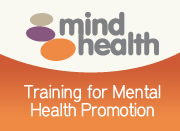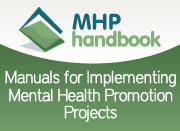Tools
- Utilities:
- Print this page
- Send this page
- Font size:
- Increase font size
- Decrease font size
Browse Database
Login, so as to add your own items.
-
Coping with Stress Course (CWS)
30/09/2009
The Coping with Stress Course (CWS), targeted at adolescents elevating depressive symptoms, or „demoralization“, is a group-based prevention programme to prevent mood disorders, unipolar depression later in life. The program involves cognitive-restructuring techniques in which participants learn to identify and challenge negative or irrational thoughts.
Settings: Education
MHP Steps: Implementation -
Zippy’s Friends
26/08/2009
Zippy's Friends is a programme for schools that helps children – five, six & seven years old to develop coping and social skills. The programme is built around a set of six stories. Zippy is a stick insect and his friends are a group of young children, and the stories show them confronting issues that are familiar to young children - friendship, communication, feeling lonely, bullying, dealing with change and loss, and making a new start. Each story is illustrated by brightly coloured pictures. It usually runs for 24 weeks, with one 45-minute session each week. Zippy´s Friends is based on extensive research and has been evaluated in many countries. It has also been endorsed by the WHO and national governments. Settings: Education
MHP Steps: Implementation | Needs Analysis | Preparation -
The "Friends" Programme
26/08/2009
The Friends Programme is a leading school-based anxiety prevention program that helps children aged 7-11 and teenagers aged 12-16 cope with feelings of fear, worry, and depression by building resilience and self-esteem and teaching cognitive and emotional skills in a simple, well-structured format. Cognititive-behavioural intervention includes ten child sessions and three parent sessions. Settings: Education
MHP Steps: Implementation -
Olweus Bullying Prevention Program
26/08/2009
The Olweus Bullying Prevention Program is a comprehensive, school-wide program designed for use in elementary, middle, or junior high schools. Its goals are to reduce and prevent bullying problems among school children and to improve peer relations at school. The program has been found to reduce bullying among children, improve the social climate of classrooms, and reduce related antisocial behaviors, such as vandalism and truancy. The Olweus Program has been implemented in more than one dozen countries around the world. Settings: Education
MHP Steps: Implementation | Follow Up | Needs Analysis | Preparation -
The Good Behaviour Game
26/08/2009
The Good Behaviour Game (GBG) is a 1st-2nd grade classroom-based management strategy for decreasing aggressive/disruptive student behavior and promoting pro-social behaviour by reinforcing inhibition in a group context. The goal of the GBG is to create a safe and predictable classroom environment which will foster improved learning and reduce the developmental risks of antisocial or disruptive classroom behaviour. Settings: Education
MHP Steps: Implementation | Follow Up | Needs Analysis | Preparation -
Sandwell Healthy Schools Scheme (SHSS)
26/08/2009
Sandwell Healthy Schools Scheme (SHSS) is an award scheme that aims to improve attainment within schools through focusing on health improvement of the whole school community. SHSS provides a framework for supporting schools in identifying and developing key priorities for improving the health and well being of all individuals within the school community and it has four themes: 1) Personal, Social and Health Education (PSHE), including Sex and Relationships Education (SRE) and Drugs Education; 2) Healhty Eating; 3)Physical Activity; 4) Emotional Health and Wellbeing, including Bullying. These themes relato to both the shool curriculum and the emotional and physical learning environment in school. Settings: Education
MHP Steps: Implementation | Needs Analysis | Preparation -
Wired for Health
26/08/2009
Wired for Health series of websites are interactive information packages about emotional well-being and mental health and how it links to other health related issues. It aims to provide accurate and engaging information relating to the health of children and youth and young people for young people, parents, teachers, health and education professionals. Program has four sites for young people, covering a range of health topics: Welltown for the 5-7 age group; Galaxy-H for the 7-11 age groups; LifeBytes for 11-14 age group; Mind, Body and Soul for 14-16 age group. In addition there are separate part for health and education professionals interested in young peopleś health. Settings: Education
MHP Steps: Implementation | Needs Analysis | Preparation -
Children's Depression Inventory (CDI)
26/08/2009
CDI, created by Maria Kovacs, evaluates the presence and severity of specific depressive symptoms in children so that you can develop a targeted treatment plan. It is commonly administered in schools, guidance clinics, and medical pediatric settings by psychologists, social workers, counselors, and mental health professionals. Key areas measured: negative mood, interpersonal problems, ineffectiveness, anhedonia, negative self-esteem. CDI is applicable for ages 7-17 and it uses self-report, parent-completed report and teacher-completed. Administration time on average is 10–30 minutes. Settings: Education
MHP Steps: Implementation | Follow Up | Needs Analysis | Preparation -
The Flemish School-Based Anti-Bullying Programme
26/08/2009
The Flemish school-based anti-bullying programme focuses directly on bully/victim problems and attempts to reduce levels of peer aggression and victimisation by intensive use of the school environment among primary and secondary school students. The programme includes activities which address the school environment, the peer group and students directly involved in bully/victim incidents; parents, teachers and peers are actively involved. The programme aims to: (1) increase adult and student awareness of problems of peer aggression and victimisation, (2) enhance active involvement in solving bully/victim incidents. Settings: Education
MHP Steps: Implementation | Preparation -
Mentally Healthy Workplace Training Programme
21/07/2009
The Mentally Healthy Workplace training programme was developed by the Scottish Centre for Healthy Working Lives in partnership with the Scottish Development Centre for Mental Health. It is a 2-day training programme for employers/managers which is designed to highlight the impact of mental health on the workplace and deliver the key messages on promoting positive mental health and encourage good practice in workplaces. The training workshops are delivered to employers by a team of trainers throughout Scotland. It is co-ordinated and managed by the Scottish Centre for Healthy Working Lives Settings: Workplace
MHP Steps: Implementation | Follow Up



